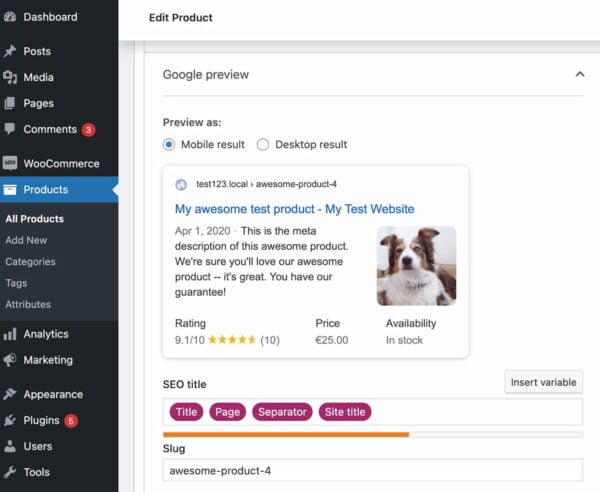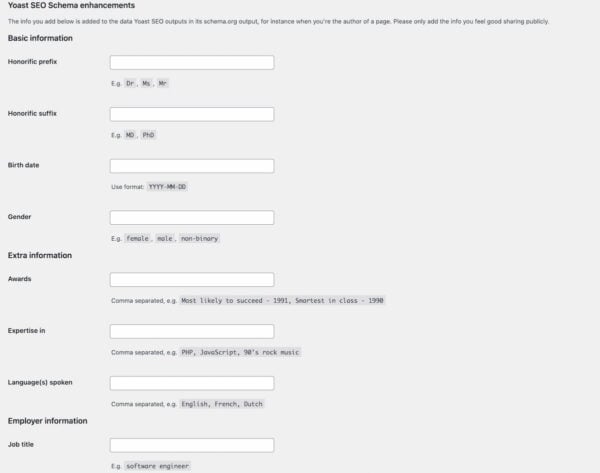Yoast SEO 16.3: Schema structured data improvements

Making sure search engines can understand your site is one of the top priorities in SEO. One of the most effective ways of getting that understanding is to add Schema.org structured data. This describes the different parts of a page to get what every piece is about. Yoast SEO adds structured data automatically, plus it comes with features to fine-tune what you present to search engines. Yoast SEO 16.3 expands on that and in Premium, lets you enhance your personal profile in Schema. Also, WooCommerce SEO has a cool new feature!
WooCommerce SEO 14.0: A product snippet preview
We want to start off this structured data-themed update with a cool update of our WooCommerce SEO plugin. Product structured data is essential for online stores. If you add it well, your products might be highlighted in Google with star ratings and prices, for instance. To help you visualize how this might look, we’ve just added an awesome new feature to our WooCommerce SEO plugin.
In WooCommerce SEO 14.0, we’ve added support for product previews in the Google Preview of Yoast SEO. You can now see the rating, number of reviews, price, and availability in the Google Preview for products to match Google’s search results. Of course, it works in both mobile and desktop preview mode. This a great tool to help you improve your product snippet.
In addition, we’ve improved the priceSpecification Schema.org output to prevent warnings from Google Search Console.

Schema.org structured data is so important right now
Structured data is one of the key aspects of modern SEO. Many of the current rich results — like the product-related ones in the screenshot above — are powered by structured data, with a lot more probably around the corner.
Launching your site without structured data will leave you at a distance from the get-go, especially if you are working with recipes, for instance, where it really is a must-have feature of your site. Make sure you have a chance at those awesome rich results!
Yoast SEO builds a full graph for your site
Yoast SEO adopted Schema.org structured data early on but rewrote the history books with Yoast SEO 11.0. Since then, we build the most complete, integrated graph for your site that fully describes every nook and cranny of your site to search engines. This all happens automatically! We only ask you to set the Knowledge Graph and Schema.org settings in Yoast SEO — you can find this in the Search Appearance section. Pick if your site represents a person or an organization and fill in the name and upload an image or logo.
All of this is powered by a solid foundation and comes with a powerful Schema.org API to make it fully extendable. This way, you can fit it into every kind of project — big or small.
We have fully documented our research and development of the Schema.org implementation and you’re welcome to read it!
Structured data enhancements in Yoast SEO 16.3
Yoast SEO 16.3, comes with a load of enhancements for our Schema.org implementation. Here’s a quick overview of some of the improvements in Yoast SEO 16.3:
- First, you can now add multiple FAQ blocks to a post or page.
WebPageandArticleschema support anaccessibilityFeatureproperty, which lists the accessibility features contained within that piece. One of the valid values istableOfContents. We now add this when a post includes the Yoast SEO Table of Contents block, withWebPageSchema as a fallback.- We’re enhancing the
authorpiece by adding theurlproperty on a post when author archives are enabled. - You’ll now find the
wordCountattribute in yourArticleschema. - We’ve added a
thumbnailUrlattribute toArticleSchema pieces. - Using the new
wpseo_schema_person_datafilter you can filter thePersonSchema by the user’s ID. We use this to provide new Person structured data in Yoast SEO Premium, see the next paragraph.
At Yoast HQ, structured data has one of the highest priorities, and we keep improving our implementation. In addition, we’re also actively contributing to the Schema.org standards body by giving feedback and suggest possible enhancements to it.
New Person capabilities in Yoast SEO Premium
In Yoast SEO Premium, you’ll find a new section in your personal profile in the WordPress backend. Below the Personal Profile section, you’ll see a new Schema enhancements listing. Here, you can fill in more information about yourself that Yoast SEO will add to your Person structured data on your site. This way, you can give Google extra information to solidify its knowledge of you.
In an age where trustworthiness and authoritativeness are playing a bigger role by the day, it’s good to offer a way of providing search engines with more solid information about you. So, if you ever want Google to know about the titles you had, awards you won, or what expertise you have — now you can!
Keep in mind, everything you fill in will be out in the open. Don’t add your social security number or anything! Also, please don’t make stuff up — make sure it is verifiable.

Other Yoast SEO Schema.org structured data features
Besides building an impressive graph for your site, Yoast SEO comes with a load of other cool structured data goodies. For one, we give you all the controls needed to specify on a per post or page basis what type of content is on that particular page. This means you can describe your contact page as being a ContactPage — this makes it instantly clear to search engines that represent just that.
Yoast SEO also comes with very cool structured data blocks. These blocks use the power of the WordPress block editor to give you an easy-to-use way of adding particular types of content while also automatically adding valid structured data. Using these will help you get rich results for those types. Currently, we have blocks for FAQs and How-tos, with much more on the way.
Update now to Yoast SEO 16.3
Yoast SEO comes with a great Schema.org implementation that helps you get those rich results. We provide you with the tools needed to provide you with a site that machines can read properly. Plus, we make it easy for you to add specific types of content with our structured data content blocks. In Yoast SEO 16.3, we’ve further streamlined our structured data output to make it even better. And in WooCommerce 14.0, you can now see how your product might look in the search results pages thanks to a new preview feature.


I’m integrating the FAQ block at Yoast recommendation. However, I can’t find a way to customize it such as a larger subhead font. Is there a way besides adding CSS to make changes to the look?
After reading your blogs I think I need to move on to WordPress and start using your plugins.
Hi there! We’re definitely fans of WordPress at Yoast :) If you want to know more about why we love WordPress and its plugins, this article might be a good read: https://yoast.com/wordpress-user-friendliness/
Will there be schema for job listings in new update?
Hi Craig! Thanks for your comment. It’s definitely on our list, but I can’t make any promises as to when it will be released :)
One question, adding “thumbnailUrl” attribute to Article Schema pieces, is a way to differentiate from “image”? I mean, if you want to use the main image of the article as a thumbnail, “thumbnailUrl” is not necessary, right?
Hi Pablo,
You’re right in thinking that there’s some overlap in these properties. However, there’s some nuance here… An article can have multiple images in the ‘image’ property. And we see that Google Discover benefits from having a dedicated thumbnail property. So it makes sense to include both.
Thankfully, you don’t need to worry about managing it; we handle the markup (and outputting the correct URLs, sizes, etc), without you having you do anything other than set your featured image(s)!
So, I must confess that I’ve been using Rank Math since it launched, but this structured data update is forcing me to try Yoast permium again, at least on some of my sites. Great work team Yoast.
Thanks, Dana! That’s great to hear :)